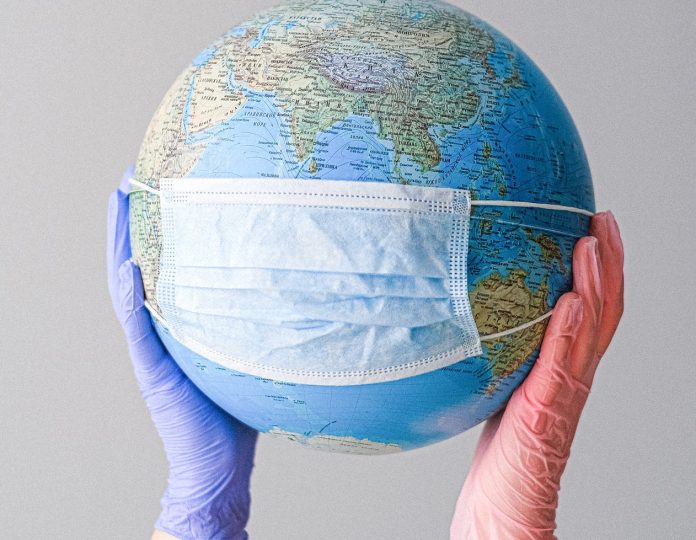Data analysis in four countries– Bulgaria, Ireland, Italyand Latvia
L.I.K.E. project – Life Investment is the Key to Employmentis implemented in a broad partnership and is working internationally, seeking pan-European solutions for social inclusion and sustainable employment for young people with mental health problems.
Three Youth Houses (Bulgaria, Latvia and Hungary) were built and are functioning under the project. Similar activities are offered in the territory of Ireland. The way of organizing the activities in the houses is based on the previous study carried out within the project ISOLATION AND SELF-ISOLATION OF YOUNG PEOPLE WITH MENTAL PROBLEMS. However, the 2020 Covid crisis and measures taken by the government have led to unforeseen long-term isolation, additional stress, and feelings of insecurity and fear among NEETs with frequent mental health problems. This has created a need for further research into these negative influences and to increase the dissemination of information on mental health prevention among NEETs and the general public.
The results of the data analysis are aiming to update and adapt the methodology for work in the “Hidden Likes” Youth Houses, improving the quality of the applied concepts and increasing the possibilities of the project in the new conditions of the post-covid pandemic.
Methodology
The project toolkit was developed to further address the needs of NEETs with mental health issues by examining the impact of the COVID-19 pandemic.
The methodology includes a survey using a random selection method in four countries – Bulgaria, Italy, Latvia and Ireland. In contrast to the previous research, here Italy is present instead of Hungary.
The target group includes young people between 15 and 29 years of age with mental health problems, and there is an increased sample of young people between 25 and 29 years of age, including more than 10% of Roma people.Качество на живот, доверие и взаимоотношения
Quality of life, trust and relationships
The results show dynamics in the work status of young people during the pandemic. One in four have lost their job and one in six have started a new job. For 60% of respondents, there was no change.
Did your work status change because of the pandemic?
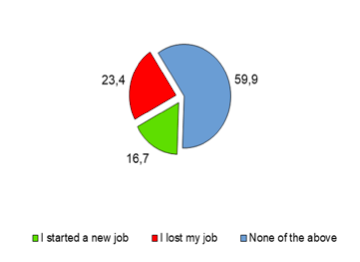 The distribution by country does not show large deviations – most frequentthey answer that they started work in Bulgaria – 19%, and leastfrequentin Italy – 15%.
The distribution by country does not show large deviations – most frequentthey answer that they started work in Bulgaria – 19%, and leastfrequentin Italy – 15%.
Regarding job loss, this happened most often in Ireland – 29%, and least often – in Bulgaria – with 21% of respondents.
More than half of the young people surveyed – 56% answered positively to the question whether they have facedfinancial losses as a result of the pandemic.
Have you experienced any financial loss due to the pandemic? (overall and by country)
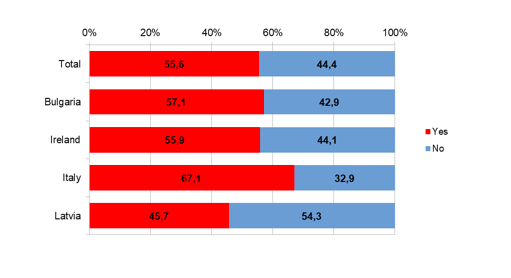
The amplitude by country is more noticeable here – this is the most often answered in Italy (67%), and the least often – in Latvia (46%). Bulgaria and Ireland are close to the average for the whole population – 57% and 55%, respectively.
Did the pandemic affect your familial relations? (overall and by country)
Four out of ten respondents estimate that the pandemic has had a negative impact on family relationships and that they have become more strained. Only one in ten reported that they had improved. According to half of those surveyed, relations have not been affected by the pandemic.
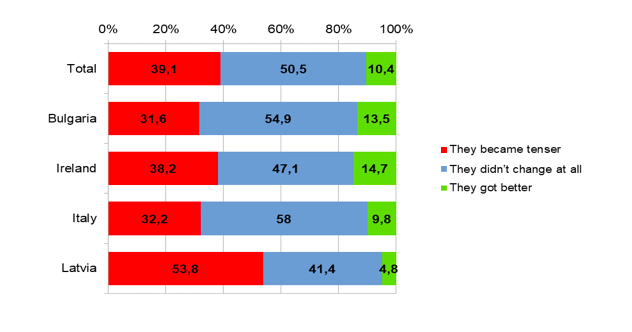
Family relations in Latvia were most negatively affected – 54% of respondents share a similar opinion. There is also the smallest share of those who believe that relations have improved – only 5%. In contrast, 15% of the Irish believe that relations have moved in a favourable direction.
The smallest share of those who believe that relations have worsened is the Bulgarians – 32%, with the largest number of those who believe that there has been no change – 55%. In Bulgaria, 14% admit that relations have improved.
Insults and rudeness were most frequent in Latvia – 48% positive answers, and least often in Bulgaria – 27% positive answers. Ireland and Italy are close to the overall average.
Predominant problems during the pandemic young people from the four countries had about nutrition and appetite (37%). In second and third place are smoking (25%) and computer games (24%). Alcohol is fourth with 18%, and drugs are fifth with 8% of responses. It is noteworthy that twice as many women as men declared that they had problems with eating and appetite during the pandemic.
18% of respondents said that the pandemic has significantly worsened their physical health, and 26% – their mental health. Together with the answer “it got worse to some extent”, the share of those who said that the pandemic hurt their health increased significantly.
For physical health, it turns out that almost 60% have deteriorated physical health, and for mental health – almost 68%.
There is a statistically significant relationship between the deterioration of physical and mental health.
From the focus groups conducted with parents of NEETs with mental health problems in the 4 partner countries of the project (Bulgaria, Italy, Latvia and Ireland):
A year after the lifting of restrictive measures in connection with the Covid-19 pandemic, researchers from the Italian organization Codici and experts from the Latvian Association “Assistance for Integration, Employment and Socialization” /PINS/ focused their efforts on establishing the long-lasting effects and consequences that the pandemic left on NEETc. Meetings were held with the parents of the young people, who are often disadvantaged, excluded from the labour market, do not study and suffer from various mental difficulties. They were asked to share their observations and views on the obstacles the pandemic has put in front of them and the impact the unprecedented situation of isolation has had on their mental health and functioning.
The aggregated data from the narratives of parents of NEETs in both countries indicate that the pandemic has further worsened the mental state of young people who, even before it, struggled with their insecurity, demotivation, lack of desire for self-assertion and goals, as well as pessimism and a sense of hopelessness. Data from the study of the youth in Italy show that in this unprecedented situation, 49% of young people feel insecure, and 30% of them suffer from worry and anxiety, which in some cases turn into fear (15%) and pessimism (13%).
The introduced restrictions and restrictions lead to increasing social withdrawal among young NEETS, with 45% of them sharing that even after the pandemic and the lifting of restrictive measures, they spent most of their time at home. This takes away any opportunity for social inclusion, leaving the already isolated NEETs completely cut off from the outside world, further hampering their socialisation, integration and inclusion in the labour market.
There is a statistically significant relationship between the deterioration of physical and mental health.
Did the pandemic have a negative effect on your physical health?
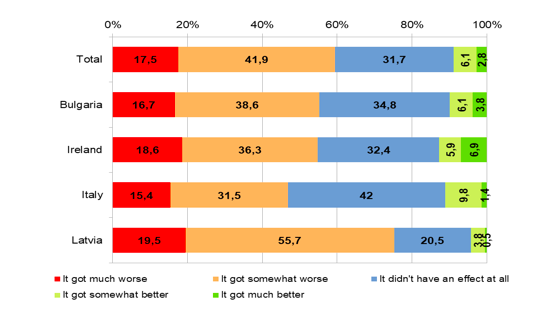
Variations by country are not large about the answer “worse significantly”, but for “it has worsened to some extent” – the differences are of large amplitude. This is the most common answer in Latvia – 56%, and the least – in Italy – 32%. Thus, it turns out that in Latvia the negative impact of the pandemic on physical health reaches 75%, and in Italy – 47%.
The results of the research show alarmingly large shares of young people who reported personal problems during the pandemic – 38% “anxiety”, 37% each “lack of desire to communicate, anger” and “insecurity, self-doubt”, 35% “depression”, 34% “fear, panic”, 25% “internet, social networks, electronic games”, 21% – “eating problems”, 13% – “use of drugs, alcohol” and 7% – “problems with the law”.
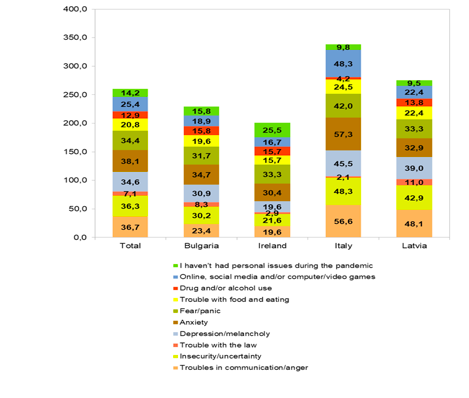
In Italy, Ireland and Bulgaria, the leading problem during the pandemic is “anxiety” – respectively 57%, 30% and 35%. In Latvia – “the lack of desire to communicate, anger” – 48%, while in Italy this problem is also recognized as leading by 57%.
Additional needs and support needs arise
Getting support from friends and family is most important for young people. Six out of ten survey participants said it was their priority. Support from friends and family is most important for Latvians – 64%, followed by Irish (58%), Italians (57%) and Bulgarians (54%).
For the Bulgarians, with the same percentage (45%), sharing with loved ones and avoiding negative people share second place. In third place are activities with other young people (44%). The percentage of receiving services is relatively lowest in Bulgaria (33%), and the highest in Italy (43%).
Support related to “social-psychological and medical services” is indicated as the most significant (48%). With similar values are the “internship and work programs” (43%) and “training and qualifications” (45%). Every third indicated that they needed “career counselling and guidance”.
‘You can’t go back and change the beginning, but you can start where you are and change the ending’. C.S. Lewis.
The Covid crisis is the worst global crisis since World War II. Along with the tragic loss of life, it has also resulted in physical and mental health damage, loss of jobs, social connections and trust. As UNICEF has warned in a leading report, children and young people will feel the impact of COVID-19 on their mental health and well-being for years ahead. The signs of recovery we are seeing are encouraging, but they are fragile and highly uncertain, and we must remember that no country or group can recover on its own. This is especially true when it comes to vulnerable groups such as young people who are not engaged in education, training or employment and have mental health problems. For them, the monitoring for the presence of post-covid syndrome related to mental health applies fully. The results of the study in the four countries show a deterioration in their quality of life due to the pandemic in various aspects:
- One out of four have lost their job and only one out of six have started a new job.
- Every second person has faced financial losses due to the COVID crisis.
- Four out of ten respondents estimate that the pandemic has hurt family relationships and that they have become more strained.
- Every third says that they have had cases of insults, rudeness, and physical violence in the family.
- Every third person during the pandemic had problems related to nutrition and appetite, and this is twice as common in women.
- Harmful habits spread wider among young people, with one in four having problems with smoking and computer games. Every fifth – with alcohol, and every tenth with drugs.
- Six out of ten young people declare that their physical health has deteriorated during the pandemic, and seven out of ten – their mental health (significantly or to some extent). There is a statistically significant relationship between the deterioration of physical and mental health.
- The shares of young people who reported personal problems during the pandemic are alarmingly high – 38% “anxiety”, 37% each “lack of desire to communicate, anger” and “insecurity, self-doubt”, 35% “depression, depression”, 34% “fear, panic”, 25% “internet, social networks, electronic games”, 21% – “problems with eating”, 13% – “use of drugs, alcohol” and 7% – “problems with the law”.
The results of the research in the four European countries show unequivocally that there are opportunities for targeted country-specific interventions to improve their social well-being.
They should be focused on:
- Strengthening the perspective of the beneficiariesof services and care
- Promotion of independence and normal life, but also close monitoring
- Expansion of community-based services and inclusion of relatives of service users
- Reducing stigma and promoting better understanding of mental health through awareness campaigns
- Strengthening protective factors such as a loving family, safe school/work environment and positive peer relationships
- Integrated approach to risk prevention, early interventions
- Quality social psychological and medical services for both physical and mental health
- Encouraging young people and caring through mentoring and mentoring
- Mental health support for parents and carers
- Mental health advocacy and social awareness campaigns.

